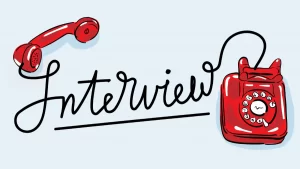
Phone Interview Questions & Answers That Will Get You Hired Today
Phone interviews have become a crucial first step in the hiring process, with most companies using them to screen candidates before face-to-face meetings. While they might seem easier than in-person interviews, phone interviews present unique challenges that can make or break your chances of advancing to the next round.
The key to phone interview success lies in thorough preparation, creating the right environment, and mastering the art of verbal communication when you can’t rely on body language or visual cues to make your impression.
Head Career Coach Langdon Rodda and Careers & Employment Program Director Naren Chellappah from Career Success Australia have guided hundreds of professionals through successful phone interviews, helping them navigate the nuances of remote communication and secure face-to-face interview opportunities.
Why Phone Interviews Are More Challenging Than You Think
Page Contents
Phone interviews eliminate the visual component of communication, removing your ability to read body language, make eye contact, or use gestures to emphasise points. This makes it significantly harder to gauge the interviewer’s reactions and adjust your responses accordingly.
Without visual cues, you must rely entirely on your voice, tone, and the content of your answers to make a compelling impression. This puts extra pressure on your verbal communication skills and requires a different preparation strategy than traditional face-to-face interviews.
The good news is that phone interviews also offer unique advantages, including the ability to reference notes, take the call from your comfortable environment, and focus entirely on your verbal presentation without worrying about physical appearance or nervous gestures.
Understanding Different Types of Phone Interviews
Screening Calls (5-10 minutes)
These brief calls typically focus on basic qualifications and logistics. Recruiters use screening calls to verify your eligibility, assess communication skills, and confirm details from your resume. Common screening topics include work authorisation status, salary expectations, and availability for the role.
Be prepared for quick questions about your background and motivation for applying. Even though these calls are short, they’re crucial for advancing to more comprehensive interview stages.
Formal Phone Interviews (20-45 minutes)
Comprehensive phone interviews mirror traditional face-to-face interviews, including behavioural questions, technical assessments, and detailed discussions about your experience. These interviews require the same level of preparation as in-person meetings, with the added challenge of communicating effectively through voice alone.
Expect a mix of competency-based questions, scenarios related to the role, and opportunities to ask detailed questions about the company and position.
Essential Phone Interview Preparation Steps
Research the Company and Role Thoroughly
Before your phone interview, dive deep into the company’s website, recent news, social media presence, and industry position. Understanding their mission, values, recent achievements, and challenges demonstrates genuine interest and helps you tailor your responses effectively.
Review the job description carefully, identifying key skills and qualifications they’re seeking. Prepare specific examples from your experience that demonstrate these competencies, using the STAR method (Situation, Task, Action, Result) to structure your responses.
Prepare Your Phone Interview Materials
Create a comprehensive “cheat sheet” with key information you might need during the call. Include your resume, the job description, company research notes, and prepared answers to common questions.
Essential materials to have ready:
- Your updated resume
- The job posting and any related materials
- Company research and notes
- List of thoughtful questions to ask
- Notepad and pen for taking notes
- Water to keep your voice clear
Practice Common Phone Interview Questions
Rehearse answers to standard interview questions, paying special attention to your tone and pacing since these elements become more important without visual communication.
Key questions to prepare for:
- “Tell me about yourself” (your 30-second elevator pitch)
- “Why are you interested in this role?”
- “What are your greatest strengths?”
- “Describe a challenge you’ve overcome”
- “Why are you leaving your current position?”
Practice speaking your answers aloud to ensure they sound natural and confident when delivered verbally.
Discover more on: How To Prepare For A Phone Interview
Creating the Perfect Phone Interview Environment
Choose Your Location Strategically
Select a quiet, private space with excellent phone reception where you won’t be interrupted. Test your phone signal strength in advance and have a backup plan if you experience technical difficulties.
Avoid taking calls in public spaces, noisy environments, or while driving (unless absolutely necessary and using hands-free technology). Background noise can be incredibly distracting and reflects poorly on your professionalism.
Set Up Your Physical Space
Even though the interviewer can’t see you, your physical environment affects your mental state and performance. Choose a clean, organised space where you feel comfortable and confident.
Consider standing during the interview, as this can improve your vocal projection and energy level. Many successful candidates find that standing helps them feel more alert and engaged throughout the conversation.
Handle Technology Preparation
Ensure your phone is fully charged and consider having a charger nearby for longer interviews. Test your phone’s audio quality and make sure you know how to use features like mute, speakerphone, or call waiting if needed.
Have a backup communication method ready (like a landline or different mobile phone) in case technical issues arise during the interview.
Mastering Phone Interview Communication
Your Voice Is Your Most Powerful Tool
Without visual cues, your voice carries the entire burden of making a positive impression. Speak clearly and at a moderate pace, ensuring the interviewer can easily understand every word.
Smile while speaking – this genuinely comes through in your voice and makes you sound more enthusiastic and approachable. Practice varying your tone to avoid sounding monotonous, and use strategic pauses to emphasise important points.
Listen Actively and Avoid Interruptions
Phone conversations make it easier to accidentally interrupt or speak over each other. Listen carefully to each question, take a moment to gather your thoughts, and then respond thoughtfully.
If you’re unsure whether the interviewer has finished speaking, wait for a natural pause or politely ask, “Did that answer your question?” This shows respect and ensures clear communication.
Take Strategic Notes
One advantage of phone interviews is your ability to take notes without appearing distracted. Jot down key points from the interviewer’s questions and their comments about the role or company.
This information helps you ask informed follow-up questions and provides valuable insights for later stages of the interview process.
Phone Interview Best Practices During the Call
Start Strong with Professional Phone Etiquette
Answer your phone professionally, especially if you don’t recognise the number. A simple “Hello, [Your Name] speaking” sets a professional tone from the first moment.
If the call comes at an inconvenient time, it’s perfectly acceptable to ask if you can return the call within an hour. This gives you time to prepare properly rather than being caught off-guard.
Structure Your Answers Effectively
Every response should follow a clear structure to ensure your points come across effectively without visual aids.
Effective answer structure:
- Acknowledge the question: “That’s a great question about…”
- Provide your example: Use the STAR method for specific scenarios
- Conclude clearly: Summarise your main point and relate it back to the role
Ask Engaging Questions
Prepare thoughtful questions that demonstrate your research and genuine interest in the opportunity. Avoid questions that could easily be answered by reading the company website.
Strong questions to consider:
- “What does success look like in this role after the first 90 days?”
- “What are the biggest challenges facing the team right now?”
- “How would you describe the company culture?”
- “What opportunities exist for professional development?”
Common Phone Interview Mistakes to Avoid
Technology and Environment Pitfalls
Never take a phone interview in a noisy environment, while multitasking, or without properly testing your technology first. Background noise, poor reception, or dead batteries can instantly derail an otherwise successful interview.
Don’t rely on speakerphone unless absolutely necessary, as the audio quality is often poor and can make you sound distant or unprofessional.
Communication Missteps
Avoid speaking too quickly when nervous, as this can make you difficult to understand and suggest lack of confidence. Similarly, don’t speak so slowly that you sound uncertain or unprepared.
Never interrupt the interviewer, even if there’s an awkward pause. Phone conversations naturally have different rhythms than face-to-face discussions, so allow extra time for responses.
Content and Preparation Errors
Don’t wing it just because it’s “only” a phone interview. Lack of preparation becomes even more obvious when you can’t rely on visual cues or charisma to carry you through weak answers.
Avoid giving overly long responses that might lose the interviewer’s attention. Without visual engagement, attention spans can be shorter during phone conversations.
Following Up After Your Phone Interview
Send a Professional Thank-You Note
Within 24 hours of your phone interview, send a concise thank-you email that reiterates your interest in the position and highlights key points from your conversation.
Reference specific topics discussed during the call to demonstrate your engagement and attention to detail. This personal touch helps you stand out from other candidates.
Reflect and Prepare for Next Steps
Take notes immediately after the interview while details are fresh in your memory. Record what went well, areas for improvement, and any insights about the company or role that emerged during the conversation.
Use this information to better prepare for subsequent interview rounds and to refine your approach for future phone interviews.
Advanced Phone Interview Strategies
Managing Multiple Job Applications
When you’re actively job searching, you might receive unexpected phone calls for positions you applied to weeks ago. Always ask which position the call refers to before answering questions – this shows organisation and prevents embarrassing confusion.
Keep a tracking system for your applications so you can quickly refresh your memory about specific roles and companies when calls come in.
Handling Difficult Questions
If you’re asked a challenging question and need time to think, it’s acceptable to say, “That’s a thoughtful question. Let me take a moment to give you a comprehensive answer.” This pause shows consideration rather than confusion.
For technical questions or scenarios you haven’t encountered, be honest about your experience level while expressing enthusiasm for learning and growth.
Building Rapport Without Visual Cues
Use the interviewer’s name occasionally during conversation to create connection and show attentiveness. Listen for verbal cues about their interests or priorities and reference these points in your responses.
Match the interviewer’s communication style and energy level when appropriate, but always maintain professionalism and authenticity.
Turning Phone Interview Success Into Job Offers
Understanding Next Steps
At the end of your phone interview, clarify the timeline and next steps in the process. Ask when you can expect to hear back and what the subsequent stages involve.
This information helps you follow up appropriately and demonstrates your continued interest in moving forward with the opportunity.
Leveraging Phone Interview Experience
Each phone interview provides valuable practice for improving your remote communication skills. Career Success Australia helps candidates analyse their phone interview performance and develop strategies for continuous improvement.
Strong phone interview skills become increasingly valuable as remote work and virtual interviews become more common across industries.
Take Action: Prepare for Phone Interview Success
Phone interviews are often the gateway to advancing in the hiring process, making preparation and execution crucial for your career success. The unique challenges of phone communication require specific strategies and practice to master effectively.
Focus on creating the right environment, mastering verbal communication techniques, and preparing thoroughly for the types of questions and scenarios you’ll encounter. Remember that phone interviews offer unique advantages, including the ability to reference materials and control your environment.
Your phone interview action plan:
- Research the company and role comprehensively
- Prepare and practice answers to common questions
- Set up a professional, distraction-free environment
- Test your technology and have backup plans ready
- Develop your verbal communication and listening skills
- Prepare thoughtful questions that demonstrate engagement
- Plan your follow-up strategy for after the interview
- Practice your responses aloud to perfect your phone presence
With proper preparation and the right approach, phone interviews become opportunities to showcase your communication skills and make compelling first impressions that lead to face-to-face meetings and job offers.
At Career Success Australia, we specialise in helping professionals master every aspect of the interview process, from phone screenings to final interviews. Our expert Australian team works closely with you to perfect your interview techniques, strengthen your personal brand, and ensure your resume positions you for success.
Contact us today to start preparing for your next career opportunity in Australia. We wish you success in your upcoming phone interviews!





